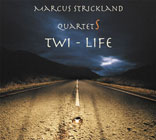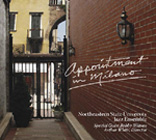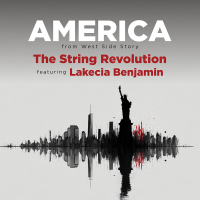Home » Jazz Articles » African Jazz » Continental Drift: Congo, Senegal & Cuba
Continental Drift: Congo, Senegal & Cuba
Roots Of Rumba Rock collects forty tracks, recorded by Congolese dancehall musicians and locally released as 78 rpm singles from 1953-55. The compilation documents some of the earliest recorded impacts of Cuban rumba in the country.
Musicians in Central and West Africa first heard rumba on records traded by visiting seamen in the 1930s. The music resonated especially loudly in Congo, for the simple reason that the root rumba rhythm had originally been taken to Cuba by Congolese slaves (the evidence for this is well documented). Rumba rhythms and Spanish guitars rapidly became defining characteristics of Congolese urban social music, and after some morphing and the arrival of electric instruments, gave birth to "Congolese rumba," one of the wonders of Africa since the 1960s. (It's almost certainly coincidental, but nevertheless intriguing, that before Congo's Belgian-colonial era, one of its autonomous regions was the kingdom of Kuba).
Kekele's Kinavana and Africando's Ketukuba showcase the evolution of the Afro-Cuban connection, in Congo and Senegal respectively, half a century on.
 Various Artists
Various Artists
Roots Of Rumba Rock: Congo Classics 1953 - 1955
Crammed Discs
2006
Congolese rumba's first golden age, in the 1960s and 1970s, was a good twenty years before the arrival of the "world music" movement. As a consequence, the music's pioneers never received the exposure which Senegalese and Malian auteurs like Youssou N'Dour, Salif Keita and the late Ali Farka Toure, for instance, enjoy on the international stage today. For many listeners, even hardcore African music enthusiasts, Congolese rumba has remained shadowy and remote, buried treasure waiting to be discovered.
But thirty years ago, the style was massively influential throughout Central, West and East Africa, exerting an influence at least as great as that of the Nigerian pan-Africanist and Afrobeat originator, Fela Anikulapo Kuti. The music travelled this far without the benefit of Kuti's "broken English" lyrics, which overcame potential linguistic barriers to Afrobeat's acceptance, at least within Anglophone Africa.
Irresistible dance rhythms aside, first generation Congolese rumba's magic, border-crossing ingredient was its guitar style. This unique gumbo of sweet melody and hard-edged rhythm was perfected in the early 1960s by African Jazz, the seminal band led by Joseph Kabasele Tshamala (aka Le Grand Kalle). Kabasele's master stroke was the introduction of a three-guitar front-line which included a "mi-solo," or half-solo, guitar sitting between the lead and rhythm instruments.
The hypnotic, criss-crossing streams of notes created by African Jazz's three guitars resembled the traditional likembe (thumb piano) music played throughout Congo and neighbouring countries, and struck a mighty chord with urban audiences who, while respecting their cultural traditions, were hungry for evolution and modernisation.
Tout Puissant OK Jazz (TPOK), led by probably the greatest Congolese guitarist of all, L'Okanga La Ndju Pene Luambo Makiadi (aka Franco, aka The Sorcerer Of The Guitar), were quick to follow African Jazz's lead, and the three-guitar front-line was soon a distinguishing characteristic of leading Congolese rumba bands.
Roots Of Rumba Rock: Congo Classics 1953 - 1955 is a two-disc set compiled by Vincent Kenis, the Belgian producer of amped-up likembe trance band Konono No.1's mindbending Congotronics (Crammed Discs, 2005). It's drawn from the one-take, one-track, shellac vaults of the Loningisa label, operated by a Greek businessman, Papa Dimitriou Antonopolous.
The low fi, high fun, three minute tracks lack the sophistication of Kabasele or Franco's mature rumba styles, and are no-frills, first-generation mash-ups of imported Cuban and Congolese roots musics. Likembes and traditional percussion feature in most of the line-ups, with admixtures of accordions, violins, saxophones, balafons and guitars. The guitars are still mainly acoustic—Prince Baudouin's "Lufungola Alphonse" on the first disc is one of the earliest Congolese recordings to feature the electric instrument.
But the music, like it says on the can, is indeed the root of Congolese rumba, and the album will fascinate rumbaphiliacs who want to dig deep into the music's genesis. Amongst its highlights are four tracks by Bowane, the guitarist credited by some Congolese musicians as the original source of Franco's style, and three more from Adikwa, another early guitar inspiration.
Other historically important tracks include Liengo's "Nyokuma" ("Move Harmoniously,") later re-interpreted by Papa Wemba, and De Wayon The Priest's "Esengo Ya Mokili" ("The Pleasures Of Life,") probably the first recording to feature Franco, then in his early teens.
Tino Mab's radio jingle "Margarine Fina"—"What do the whites use for their cooking? Margarine Fina!"—reminds us that many Congolese, in the pre-Authenticite era promoted by their otherwise extremely dodgy President, Mobutu Sese Seko, regarded colonial artefacts as superior to their own. The accompanying, well annotated and illustrated booklet provides an illuminating context for the music (and is particularly revealing about the role of women in late-colonial Congo social life).
 Kekele
Kekele
Kinavana
Sterns
2006
With Kinavana, rumba supergroup Kekele's third album (titled to reflect the music's twin Kinshasa and Havana roots), we fast forward past the heyday of Congolese rumba defined by African Jazz and TPOK, to the soukous-flavoured revival kick-started out of Paris in the 1980s by musicians like Les Quatre Etoiles (Four Stars), Sam Mangwana and Papa Wemba. Three of the Etoiles' founder members—vocalists Wuta Mayi and Nyboma Mwan'dido and guitarist Syran Mbenza—are amongst the core Kekele quintet, which also includes veteran vocalists Loko Massengo and Bumba Massa.
Featured guests include Cameroon-born saxophonist Manu Dibango, who played with African Jazz in Congo in the early 1960s, and the even-more-veteran guitarist Papa Noel, back in the band after a hiatus caused by illness, whose career goes back to the 1950s and the Rock-A-Mambo band. Guest vocalists include M'Bilia Bel, the grande dame of Congolese music over the last twenty-five years, and Madilu "System" Bialu, who sang the lead on many of Franco's biggest hits of the 1980s.
Kinavana is a tribute to the Cuban guitarist and singer, Guillermo Portabales (1911 - 1970). All twelve tracks are based on songs composed or recorded by Portabeles and were amongst the primary source material for Congolese rumba in the 1950s and 1960s. But there's a twist. In place of the original Spanish lyrics Kekele have written new ones in Lingala. The seven and a half minute centrepiece of the album, "Ba Kristo," for example, is based on the music of Portabales' "El Carretero," but instead of telling a wagoner's tale now denounces the efforts of Evangelical churches in Africa to ban any music they consider un-Christian.
Non-Congolese guest musicians, assembled by Venezuelan producer Nelson Hernandez, include some outstanding New York-based Latin musicians—vocalists Joe King and Isabel Martinez, percussionist Luis Quintero and trumpeter Richard Viruet amongst them. Hernandez's delicious arrangements include charanga flutes and violins on some of the tunes, and sexteto-style trumpets on others.
Subtle, sophisticated, melodious and irresistibly body rocking, listening to Kinavana is a bit like drinking spiced hot chocolate on a grey winter day. You can't beat it for an inner glow.
 Africando
Africando
Ketukuba
Sterns
2006
Another vocal supergroup, this time originating in Senegal, Africando are to modern salsa what African Jazz and TPOK were to 1960s' Cuban rumba: re-Africanisers of a tradition seeded in the New World by African slaves. The instrumental sound is loud, brassy (there are three trumpets and three trombones), extrovert and party hard, but the vocals, mostly sung in Wolof and Manding, and their arrangements, are deeply, unhurriedly and mellifluously African.
Ketukuba is the group's seventh album and takes its title from a dialect originating in Benin. The word translates as "from the origin to Cuba"—"the origin", of course, being Africa—and the album is dedicated to the late Gnonnas Pedro, a Beninois who sang with Africando from 1996 (when he replaced the great Senegalese vocalist Pape Seck) until his passing in 2004.
Africando's line-up has been through other changes since the group first recorded fourteen years ago, but longtime members Amadou Ballake, Sekouba Bambino and Medoune Diallo remain the centrepiece of the core vocal sextet. They're joined by Diallo's son, Lodia Mansour, a rising star in Senegal, and two other young Senegalese, Pascal Dieng of Super Cayor and Basse Sarr of Orchestre Afro-Salsa De Dakar.
Ketukuba is equal parts Latin and Senegalese. Kinavana producer Nelson Hernandez is again crucial to the music, this time as arranger and baritone saxophonist (his sound is so rich, big and forward in the mix that it often packs the punch of an entire saxophone section). Other familiar guests are vocalist Joe King and percussionist Luis Quintero. Nelson Rodriguez plays Cuban tres guitar, and Efrain Davila authentic, unmorphed, Latin-salsa piano.
All but two tracks are band originals. King takes the lead vocal on the Fania All Stars' classic, "Nina Nina," and Kekele associate Madilu Bialu gives a salsified reading of "Mario," the landmark hit he originally recorded with Franco in 1985.
It's a very close call, but perhaps the greatest track is "Ker," which features a duet between father-and-son team Diallo and Mansour. Acknowledging his father's protection, Mansour sings, "Father, you are my tree/I am your shadow." It's a touching, and very African, moment to savour in an album that's full of depth and beauty.
Tracks and Personnel
Roots Of Rumba Rock: Congo Classics 1953 - 1955
Tracks: CD1: Kotiya Zolo Te; Mam'alobi Na Balayo; Tembe Na Tembe; Noko Akomi Mobali; Tika Lofundu; Menagere; Ah, Ngai Nzambe; Odjali Na Mouchoir?; Belito; Margarine Fina; Nyekese; Angelique; Nyokuma; Prince Baudouin; Towuti Brazza Toye Kisasa; Mazole Vanga Sanga; Nalekaki Na Nzela; Kitoko Na Yo Ekosaki; Esengo Ya Mokili; Na Mokili Moko Te. CD2: Esengo Ya La Beaute; Balobi Na Pimbwa; Caroline; Senene Mingi; Banani Wana?; Boyoki Lisolo?; Kanisa, Elise; Mbula Ebeti, Naleli; Nicodeme Lulu; Oka Banzola; Bana Bosenge; Osi Dia Mba Nyue; Liwa; Ayebi Kobota; Mwasi Wa Kalemba; Tuba Mbote; Olingi Na Sala Boni; Liwa Ya Nkoko; Bomba Na Motema.
Personnel: Bowane; Liengo; Adikwa; Kalima Pierre; Lisanga Pauline; Luyeye Gaston; Kitenge; Amba Josephine; Tino Mab; De Wayon; Lufungola Alphonse; De Malo; Bokalanga; Kalafayi; Kalafayi Jean; Fataki Camille; Nganga; Taureau; Bolali Pedro; Same Raymond; Bossocould David.
Kinavana
Tracks: Mace; Tokobuka Mikuwa; Tapale; Ponton La Belle; Ba Kristo; Fungola Motema; Yo Odeconer; Yoka Biso; Oh Miguel; Tubela; Cherie Sandra; Consequence.
Personnel: Kekele: Loko Massengo, Wuta Mayi, Bumba Massa, Nyboma Mwan'dido: vocals; Syran Mbenza: rhythm and lead guitar. Guests: Mbilia Bel Madilu System Bialu: vocals; Papa Noel: solo guitar; Manu Dibango: saxophones; Isabel Martinez: vocals; Joe King: backing vocals; Ruben Rodriquez: double bass; Luis Quintero: percussion; Richard Viruet: trumpet; Andrea Brachtel: flute; Same Bardfeld, Ali Bello, Conway Kuo: violin; Marlene Rice: viola; Mary Wooten: cello.
Ketukuba
Tracks: Bogne Sirala; Malawoo; Coumba Peul; Ketukuba; Dieguema; Mario; Viens Danser Sur Le Son Africando; Fatalikou; Sagoo; Ker; Nina Nina.
Personnel: Africando: Pascal Dieng, Sekouba Bambino, Amadou Balake, Medoune Diallo, Joe King, Basse Sarr: lead vocals. Guests: Madilu System, Lodia Mansour: lead vocals. Musicians: Miguel Gomez: chorus, congas; Joel Hierrezuelo Balart, Carlos Miguel Gonzalez: chorus; Adama Conde: balafon; Erfrain Davila, Alfredo Rodriguez: piano; Ruben Rodriguez: bass; Luis Quintero: bongo, timbales, guiro, maracas; Nelson James, Raul Agaz, Ite Jerez: trumpet; Joe Fielder, Ozzie Melendez, Luis Bonilla: trombone; Nelson Hernandez: baritone saxophone; NelsonRodriguez: tres guitar; Raimundo Penforte: violin.
Tags
PREVIOUS / NEXT
Support All About Jazz
 All About Jazz has been a pillar of jazz since 1995, championing it as an art form and, more importantly, supporting the musicians who make it. Our enduring commitment has made "AAJ" one of the most culturally important websites of its kind, read by hundreds of thousands of fans, musicians and industry figures every month.
All About Jazz has been a pillar of jazz since 1995, championing it as an art form and, more importantly, supporting the musicians who make it. Our enduring commitment has made "AAJ" one of the most culturally important websites of its kind, read by hundreds of thousands of fans, musicians and industry figures every month.






















